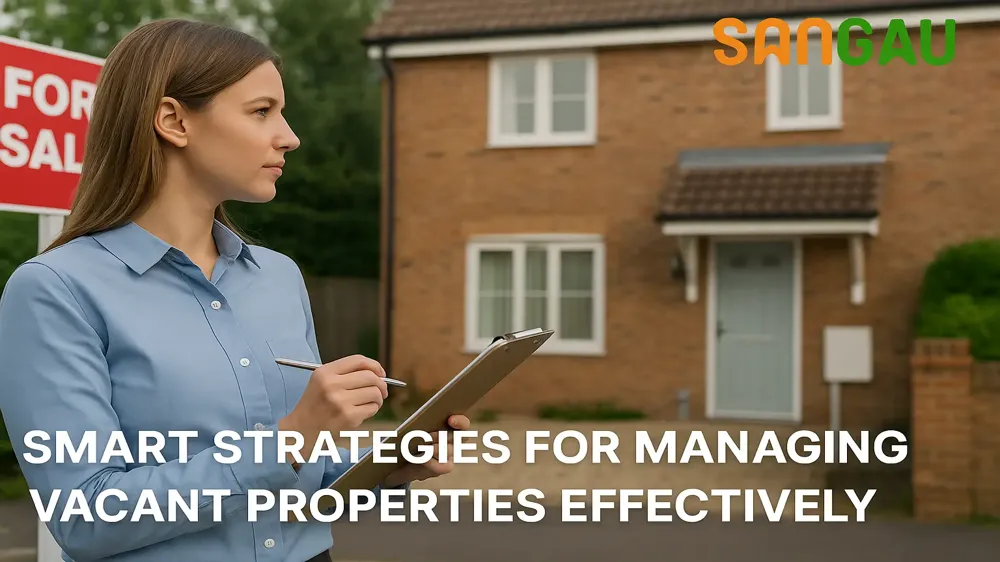Smart Strategies for Managing Vacant Properties Effectively
Published : 21 Jun 2025

Smart Strategies for Managing Vacant Properties Effectively
Are you a property manager or landlord? Welcome back to our Property Management series on the SANGAU YouTube channel. Today, we're tackling an essential topic: Managing Vacant Properties Effectively.
A vacant property isn’t just an empty space—it requires careful attention to security, maintenance, and even income opportunities. A proactive approach can safeguard your investment, maintain its appeal, and potentially generate revenue. Let’s explore the best practices to keep your vacant property secure, well-maintained, and financially productive.
1. Conduct Regular Inspections and Maintain the Property
Leaving a property unchecked for extended periods can lead to costly repairs. Routine inspections help detect minor issues like plumbing leaks, electrical faults, or structural wear and tear before they become major problems. Regular upkeep, including interior and exterior maintenance, prevents deterioration and keeps the property in prime condition. Well-kept landscaping and clean exteriors also improve curb appeal and deter trespassers who may target visibly neglected properties.
2. Strengthen Security with Advanced Safety Measures
Vacant properties are more vulnerable to break-ins, vandalism, and squatting. Investing in high-quality security systems, including motion-sensor lighting, alarm systems, and surveillance cameras, helps deter intruders. Reinforced locks and strong doors and windows add an extra layer of protection. For additional security, some landlords opt for property guardians, who temporarily occupy the space at reduced rent, keeping it secure while ensuring minimal income.
3. Maintain an "Occupied" Look to Deter Trespassers
A vacant property can be an easy target for trespassers, but creating the illusion of occupancy reduces risk. Smart lighting systems with automatic timers, scheduled landscaping services, and occasional mail or newspaper deliveries can maintain the appearance of activity. Keeping curtains or blinds partially open and ensuring that outdoor areas look lived-in can also discourage unwanted visitors.
4. Secure Specialised Vacant Property Insurance
Many landlords don’t realise that standard homeowner insurance often doesn’t cover vacant properties. Specialised vacant property insurance protects against risks like vandalism, fire, and weather-related damage. Every policy differs, so consulting with an insurance expert ensures you select the best coverage for your property. With the right insurance plan, you’re financially protected in case of unexpected incidents during vacancy periods.
5. Generate Revenue with Short-Term Income Streams
A vacant property doesn’t have to be a financial drain. Instead of leaving it unoccupied, consider short-term rental options like Airbnb or temporary workspace leasing. Some property owners rent out their properties for storage, events, or even film shoots. Another creative option is property guardianship—allowing individuals to live in the property at a reduced cost, ensuring both security and minimal income generation while keeping the space occupied.
6. Partner with a Property Management Company
If managing a vacant property feels overwhelming, a professional property management service can be a game-changer. Property managers handle everything from inspections, repairs, and security to finding new tenants. They ensure your property remains in top shape while minimising vacancy periods through effective marketing and tenant screening. This hands-free approach provides peace of mind and maintains the property's value without requiring constant personal involvement.
7. Stay Compliant with Local Regulations
Many areas have legal requirements for vacant properties, such as regular safety inspections, sanitation standards, or security measures. Failing to comply with local regulations can result in fines or legal complications. Staying informed about these requirements ensures that your property remains in good standing, allowing a seamless transition when it's time to lease again. Understanding local property laws also helps in avoiding any unnecessary liabilities.
8. Enhance Fire Safety and Utility Management
Fire risks increase in vacant properties, especially when there’s no one present to notice hazards immediately. Turning off non-essential utilities like gas and water reduces risks of fire and plumbing issues, such as burst pipes. Maintaining functional smoke detectors, fire alarms, and sprinkler systems is equally crucial. Having clearly marked emergency exits and ensuring easy access to fire safety equipment adds an extra layer of precaution.
9. Reinforce Security at Entry Points
One of the most effective ways to protect a vacant property is by securing all entry points. High-quality locks, reinforced doors, secure windows, and even window bars make it much harder for intruders to gain access. Installing visible security features such as CCTV cameras and warning signs can act as deterrents. A well-secured property reduces risks of theft, vandalism, and unauthorised occupancy.
10. Market Your Property Strategically to Minimise Vacancy
While advertising a vacancy is necessary, the way you do it matters. Too much visibility—like excessive signage—can attract unwanted attention. Instead, focus on online listings on reputable platforms where you can control visibility. High-quality images, detailed descriptions, and virtual tours help attract serious tenants quickly. If the market allows, offering flexible leasing options can also help secure tenants faster, reducing the time your property stays unoccupied.
Bonus Tip: Let SANGAU Handle Your Vacancy Management
Managing a vacant property requires effort, planning, and strategic execution. At SANGAU, we specialise in securing and maintaining vacant properties while maximising their potential for short-term revenue. Whether it’s security upgrades, routine inspections, or finding temporary tenants, our experienced team in Bangalore ensures your property remains well-managed, profitable, and ready for new occupants.
Conclusion:
By following these best practices, you can significantly enhance the security and appeal of your vacant property while optimising its financial potential. A proactive approach not only protects your investment but also ensures it remains attractive and ready for future tenants.
Hashtags:
#VacantPropertyManagement #PropertyManagement #RealEstateTips #InvestmentProperty #SANGAU


